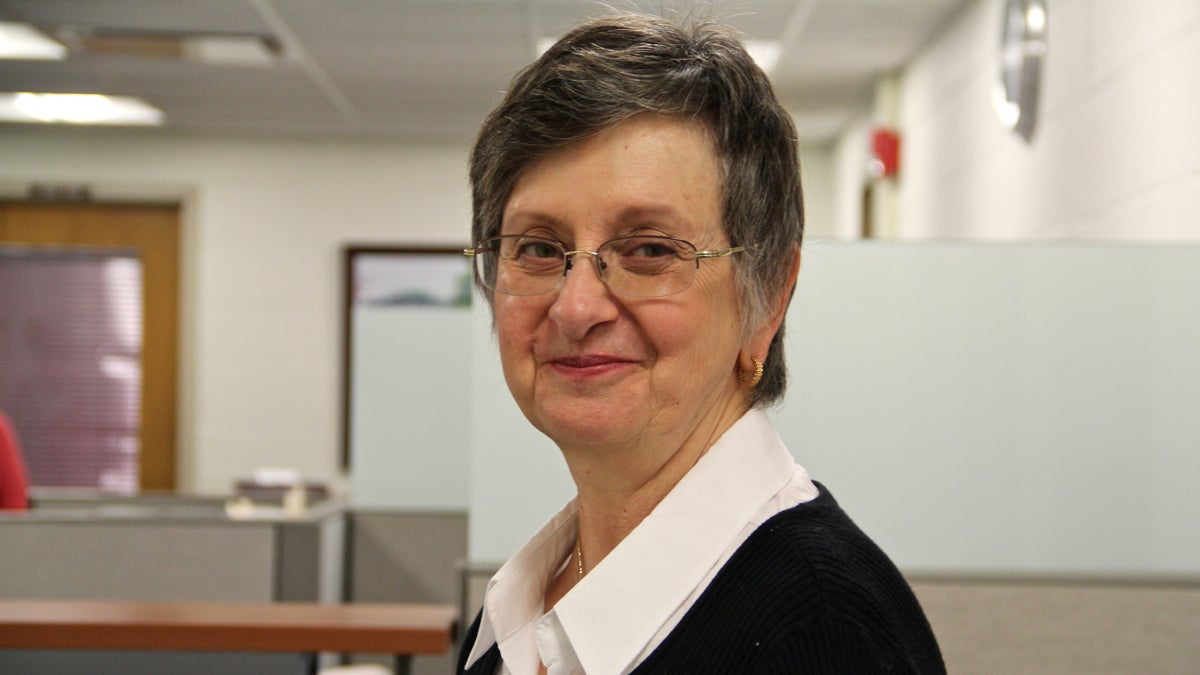If you are at high risk of developing Alzheimer’s, would you want to know?
Listen
Elizabeth Mosher volunteered to take a test to see if she had a higher-than-average risk for dementia. (Emma Lee/WHYY)
Drug trial gives people a “peek” at their brain functioning.
The Drexel Neurosciences Institute in Philadelphia and about 60 other health-research sites around the country are studying an experimental drug that researchers hope can stop Alzheimer’s disease before it starts.
A protein in the brain—called amyloid–can build up and potentially destroy thinking and memory later in life. Elevated levels of amyloid plaque develop years and decades before someone has symptoms of Alzheimer’s disease.
Everyone who has Alzheimer’s has amyloid plaque build-up, but not everyone with elevated amyloid goes on to develop dementia, explained Carol Lippa, director of the cognitive and memory disorders program at Drexel.
A4study researchers are testing the drug Solanezumab from Eli Lilly. “Sola” clears away amyloid, but what’s unclear is whether the drug can slow down Alzheimer’s or prevent people from getting the disease.
To enroll participants, scientists first need to figure out which people have plaque build-up and the associated higher-than-average risk for dementia. An imaging test, called a PET scan, gives doctors a peek at the brain—and reveals whether or not someone has high levels of amyloid.
Retired U.S. Foreign Service officer and grandmother of three Elizabeth Mosher wanted to know her risk.
“Just kind of curious,” Mosher said. “I think it’s probably my biggest fear–getting older–is to have Alzheimer’s.”
Her aunt and uncle had dementia.
“My Aunt Catherine was one of the most intelligent women that I had ever known,” Mosher said. “The last time I visited her, before it was discovered that she had Alzheimer’s, she kept asking me the same question over and over again. Then a few weeks later I found out she had been shopping and got lost and couldn’t find the exit.”
“I do not want to be an armchair granny,” Mosher said.
“In my lifetime I’ve had various physical problems, but the more I move and the more I do things, the better I feel,” said Mosher, who’s 69 and lives in Elizabethtown, Pennsylvania.
During the PET scan test, Mosher got an injection of low-level radiation in a tracer drug. The drug travels through the blood and ‘lights up’ amyloid plaque in the brain. As the drug breaks down, positron waves shoot off the body and hit crystals in the machine. A computer uses light from the crystals to create 3-D images of the brain’s molecular functions.
Mosher had to lie still inside the PET cylinder for about 20 minutes, then the scan was done.
“It’s not something that people get tested for on a regular basis,” Mosher said. “It’s a good gift. You’re doing something to really help out Alzheimer’s research and you are finding something out about yourself.”
Only healthy people—without signs of dementia—are eligible to join the study.
Sola has been studied in the past. The latest approach is to give the plaque-clearing drug to older adults who have amyloid plaque buildup but before they have symptoms of Alzheimer’s. Study participants take the test medicine or a placebo, and investigators will follow them for years to come.
To test short-term memory, volunteers complete a series of surveys and play video games at the beginning of the screening process.
The reveal
About two weeks after the PET scan, Elizabeth Mosher’s results are ready. If she has amyloid plaque buildup, that means her risk for Alzheimer’s disease is elevated.
“I’m nervous,” she said. “I’m excited to find out. Because if I don’t have it that’s a relief, and if I do have maybe there’s a treatment that I might be part of.”
After scanning Mosher’s brain, doctors say, right now, she does not have plaque buildup that can be a hallmark of dementia.
“I was holding my breath,” Mosher said. “I’m so happy.”
So what now?
Mosher will join the A4study control group. She planned a celebration dinner with her husband that evening.
Mosher also plans to write a memoir of her life for her grandkids. She joined the diplomatic corps at age 55, traveled to 25 countries in 10 years, and lived in El Salvador and Australia. She has lots of memories.
But after hearing her results, Mosher says she’s not in such a rush to get that book done.
To find a research site location or information on eligibility, visit the A4study Website.
WHYY is your source for fact-based, in-depth journalism and information. As a nonprofit organization, we rely on financial support from readers like you. Please give today.



